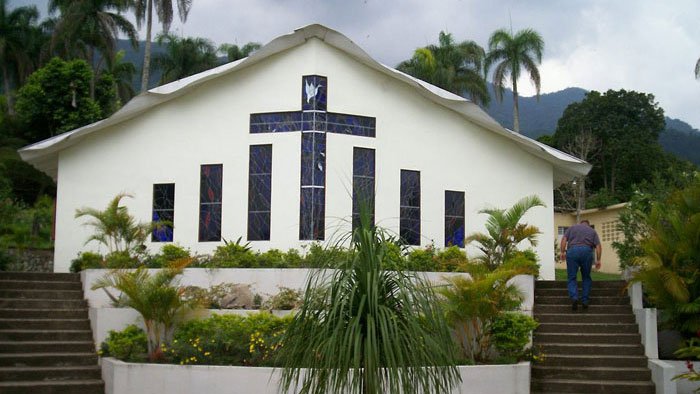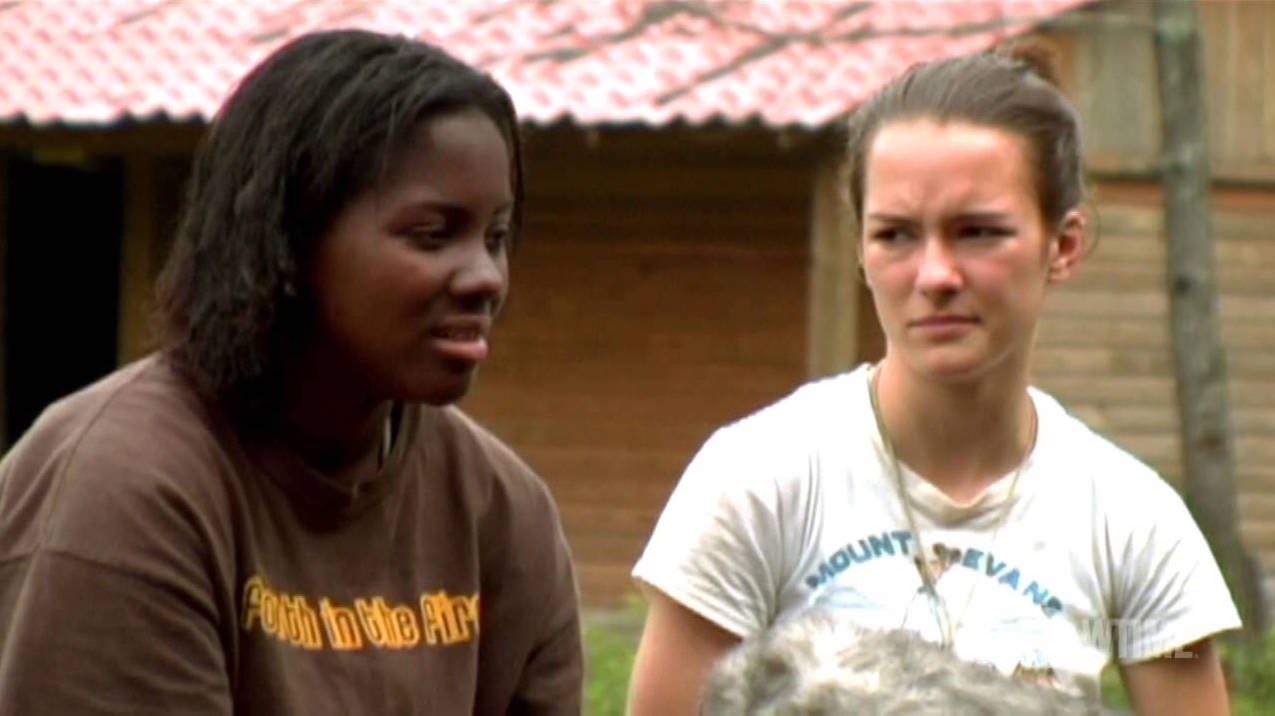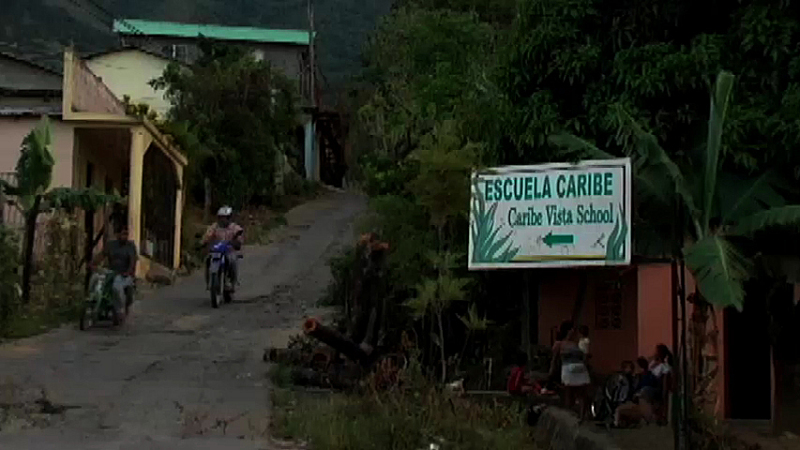Kidnapped for Christ explores the world of boarding schools for so-called ‘troubled teens’. The film reveals physical and emotional abuse and documents the psychological issues caused by staying in such places. The teenagers portrayed in the documentary found themselves in one particular institution in the Dominican Republic: the Escuela Caribe. Having been sent there for a wide range of reasons, these young people all experienced a kind of imprisonment.
FilmDoo talks to director Kate Logan.
What were your initial expectations of Escuela Caribe before you visited it?
I first visited Escuela Caribe a few years before I returned to film there. I went to one of their Sunday church services, as it was the only English-speaking service in the area. At that time, I was told by the staff that this was a school for juvenile delinquents who had been run-aways, drug addicts and criminals. Without having been able to get to know any of the students, I imagined that this was a place where under-privileged kids could get a fresh start and learn about another culture. A few years later, while in film school, I got the idea to go back to Escuela Caribe to shoot what I thought would be a short, heartwarming film about troubled teens getting their lives back on track through Christian therapy and cultural exchange. I had no idea what I was really walking into.

Upon arriving at Escuela Caribe to film, I quickly began to notice things that did not sit well with me. The punishments that some students were openly subjected to made me very uncomfortable and I began to question the methods the school was using to help their students. I also soon discovered that the students were not all the hardened criminals and delinquents that the staff had made them out to be. Many kids there seemed to have relatively normal teenage problems, or, like in David’s case, were sent there for being LGBTQ.
How do you think these institutions are able to brainwash parents into sending their children there?
These institutions are very good at playing to a parent’s deepest fears and frustrations. At the point when a parent decides to contact a troubled teen program, they are most likely already feeling desperate. It doesn’t matter if their child’s problem is extreme or mild, real or imagined, the parents are coming to the institution because they already think their kid needs help. The institution takes those fears and frustrations and magnifies them, and then they convince the parent that their program is the only way to save their child. These institutions know that the parents who contact them are desperate to help or fix their child, and they move fast to convince them that their program is the answer. I was told that it normally takes only a week from the time a parent contacts an institution and when their child is taken away and enrolled in a program.
Many institutions also use spiritual or religious manipulation, i.e. “God is telling you that this is the right choice for your child.” Then the parents can feel as if they have done the right thing to help their child, and their teenager is now out of the house and often cut off from any if not all communication with them. The parents begin to rely on the institution to report on their child’s progress, and from afar they can feel as if they are helping their kid while they remain unaware of what is really happening to them. It’s also worth noting that many of these programs are extremely expensive, and many families have to struggle to afford them. When you’ve taken out a second mortgage on your house, or dipped into retirement savings, it’s a hard pill to swallow that you may have spent that money to send your child to an ineffective and even harmful program.

If you were to be able to identify one positive impact of these institutions, what would it be?
It’s hard to say because most of these program’s methods are experimental at best and dangerous at worst. However, there are some students who report having been helped by a troubled teen program. It’s difficult if not impossible to suss out who has been genuinely helped, who is suffering from Stockholm syndrome or brainwashing, and who perhaps simply finds it easier to believe they were helped because otherwise the mental burden of knowing your parents sent you away to be abused would be too much to bear. At the end of the day, even if say, the majority of these students were genuinely helped by a troubled teen program (which we do not know because there have been no formal studies on their efficacy), if some were harmed, that’s still unacceptable.
What do you think motivated the staff at Escuela Caribe to be so cruel to the children living there?
I think that most of the staff actually had good intentions when they came to work at Escuela Caribe. The majority of them had no professional training or experience working in education or therapy, and many were also not much older than the students they were in charge of. Combine their lack of experience with the social isolation of living in a rural town in a non-English speaking third world country, and things that would seem wrong in the real world start to feel normal.
They are also taking directions from older staff members who constantly assure them that what they are doing is helping the students, and – even more importantly – warn them that these are “bad” kids and not to feel sympathy for them. Some senior staff would go as far as to make up stories about the students’ pasts to make them seem more dangerous. When a staff member came down hard on a student, even if their reaction was completely out of proportion to the offense, they were never reprimanded but rather they were often praised for loving the student enough to discipline them.
Then there were some staff members who I believe had real sociopathic and/or sadistic tendencies. I saw some staff members who truly seemed to take delight in making the lives of their charges miserable. These people were truly dangerous to the students in their care, but many of them stayed on as staff for years if not decades.

Are you aware of any cruelty-free alternatives to these institutions that offer help to so-called ‘troubled teens’?
In the U.S. the troubled teen industry is almost entirely unregulated, so it’s difficult to find programs that use tested therapy models and treat their students with respect, simply because no outside organizations are monitoring them. A program may seem professional and ethical from their website, but it takes more digging to find out what is actually going on behind closed doors. If a parent has a child who they believe needs treatment I think individual and family therapy is the best place to start, and if inpatient treatment is advised, they should be placed in the least restrictive environment possible while maintaining their health and safety.
It is unfortunately difficult for many parents who have genuinely troubled children to find programs that use effective and cruelty-free methods to address their child’s issues, but they owe it to their child to do the research and make sure that if they need to send their child away for a time that they are in good hands. Any program which restricts or monitors contact between the parent and child, proscribes lengthy stays in the program from the outset, or uses overly restrictive methods of discipline such as isolation, should be seen as dangerous.
At the end of the film, David says that he is no longer a Christian. What impact did the experience have on your own faith?
My experience making this film had a profound impact on my faith. I went into the project a devout, conservative, evangelical Christian and came out of it questioning everything. I was confronted with the fact that many of the young staff members genuinely believed that God had called them to work there. This feeling of being called to go somewhere or do something was something I had also experienced and acted on. I too felt “called” to go to Escuela Caribe to make this film. How, then, was I supposed to reconcile my belief that God had called me to expose the abuse at Escuela Caribe, and their believe that God called them to work there? I simply couldn’t think that they had all heard God wrong and I had heard him right, it just didn’t make sense.
From there, much of my hardline faith unraveled. I found myself helping to free a gay kid from a Christian boot camp, and fighting for the things I had previously preached against. Now I consider myself an agnostic, because I am no longer able or willing to believe that any one group has found the absolute truth of the mysteries of the universe. That being said, I have great respect for Christians who allow for diversity of thought within their communities and who use their faith to help others in need – like David’s community did for him.

Are you currently working on any new projects?
Right after the premiere of Kidnapped For Christ I began producing and shooting a feature documentary called An Act of Love, which tells the story of a pastor who was put on trial and kicked out of his Church after officiating his son’s same-sex wedding. An Act of Love is a hopeful story that shows the love and strength of inclusive Christians who reject their denomination’s prohibition against same-sex marriage. An Act of Love will be released on January 10th in North America on iTunes, Amazon and other VOD platforms, as well as on DVD. Currently, I am working with Academy Award-winning producer Glen Zipper (Undefeated) on several feature documentary projects which should hit the festival circuit in 2017. I also continue to work alongside other activists and the Los Angeles LGBT center to push legislation which will regulate residential programs for teens in the U.S. This year we got legislation passed in the State of California, with the hope that this could be a model for other State and federal legislation.
Watch Kidnapped for Christ on FilmDoo now!
FilmDoo also recommends:








